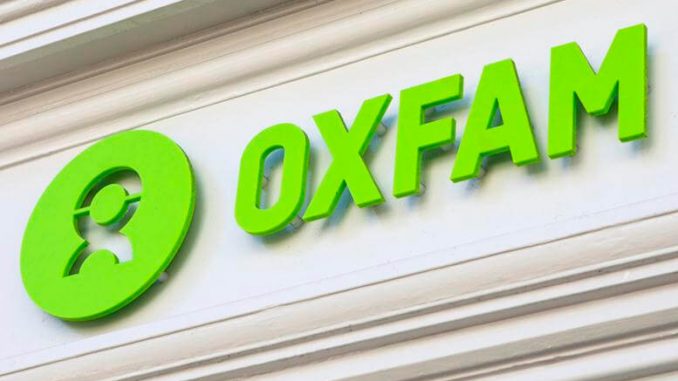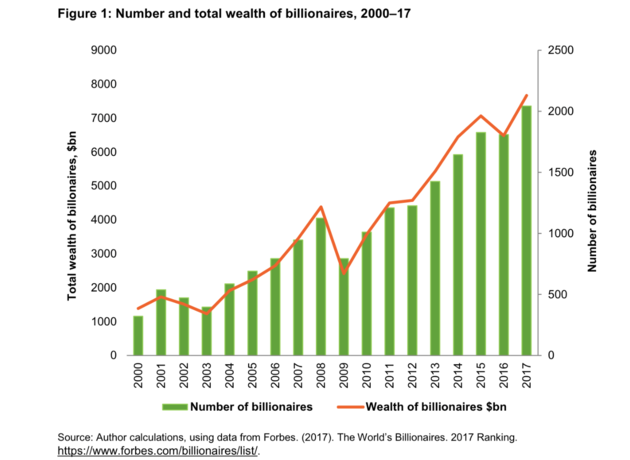The widening inequality in the world
January 23, 2019 | Expert Insights

The new Oxfam International report reveals that 26 richest people own the same wealth as the poorest half of humanity, indicating a widening in the concentration of the world’s wealth.
Background
Oxfam is a confederation of 20 independent charitable organisations that focus on the alleviation of global poverty. Oxfam's programmes primarily address the structural causes of poverty and related injustice. They work mainly through local accountable organisations, seeking to enhance their effectiveness. Oxfam believes that poverty and powerlessness are avoidable and can be eradicated through human action along with political will.
Wealth inequality is the unequal distribution of assets among the citizens of the world. A study in 2017 revealed that the world’s richest 1 per cent own half the world’s wealth. It also highlighted the growing gap between the super-rich and everyone else. The world’s wealthiest people have seen their share of the globe’s total wealth increase from 42.5 per cent at the height of the 2008 financial crisis to 50.1% in 2017, or $140tn (£106tn), according to Credit Suisse’s global wealth report.
“The share of the top 1% has been on an upward path ever since [the crisis], passing the 2000 level in 2013 and achieving new peaks every year thereafter,” the annual report said. The report said, “global wealth inequality has certainly been high and rising in the post-crisis period”.

Analysis
In the latest report published by Oxfam International, the world's 26 richest people own the same wealth as the poorest half of humanity. Oxfam also highlighted that the year 2018 saw the rich becoming richer and the poor becoming poorer.
The report, titled "Public Good or Private Wealth," highlights the growing accumulation of wealth by the richest, and a reverse trend in the poor, which has grown by 11 per cent. It was estimated that more than 2,200 billionaires across the globe saw an increase in their wealth by $900bn in 2018 – or $2.5bn a day. The 12 per cent increase in the wealth of the very richest contrasted with a fall of 11 per cent in the wealth of the poorest half of the world’s population.
Other findings of the report show that despite a decade after the global financial crisis, the number of billionaires has doubled. Between 2017 and 2018 a new billionaire was created every two days. In comparison, the report findings indicated, Amazon CEO Jeff Bezos’s fortune increased to $112bn last year. Oxfam also pointed out that one per cent of his wealth is equal to the entire health budget of Ethiopia, a country of 105 million people.
The underlying conclusion of the report is that the world is yet to witness a drastic reduction in poverty in the world. However, it highlights that around 3.4 billion people have not escaped living in poverty with less than $5.50 a day. On the same hand, the widening gap between the rich and the poor are undermining the battle against damaging poverty economies and an increase in public anger.
The annual report published in 2018 showed that 42 people in the world boast as much wealth as the 3.7 billion who make up the poorest half of the world’s population. Hence in comparison to this year, 26 billionaires to match the wealth of 3.8 billion people.
Oxfam also exposed that women and girls are the hardest hit by the rising inequality, as men own 50 per cent more of the total global wealth and control 86 per cent of corporations.
Winnie Byanyima, executive director of Oxfam International, said: "People across the globe are angry and frustrated. Governments must now deliver real change by ensuring corporations and wealthy individuals pay their fair share of tax and investing this money in free healthcare and education that meets the needs of everyone.”
One of the suggestions that Oxfam made was to get the world's wealthiest one per cent to pay just 0.5 per cent extra tax on their wealth. This could raise more money than it would cost to educate the 262 million children out of school and provide life-saving healthcare for 3.3 million people.
Assessment
Our assessment is that Oxfam annual reports are a wake-up call for the world to urgently bridge the inequality gap. We feel that though there has been a significant fall in the number of people living in extreme poverty, rising inequality is hampering further progress. We strongly urge governments to fund high-quality public services and rebuild social contracts with the majority by ensuring some form of universal income. We feel that the timing chosen to publish the report was apt as it was released just before the world leaders meet in Davos.
India Watch
According to the Oxfam report, India added 18 new billionaires last year, raising the total number of billionaires to 119, while their wealth crossed the $400 billion (Rs. 28 lakh crore) mark for the first time. Oxfam also highlighted that the combined revenue and capital expenditure of the Centre and states for medical, public health, sanitation and water supply are Rs. 2,08,166 crores, which is less than the country' richest man Mukesh Ambani's wealth of Rs. 2.8 lakh crore.








Comments